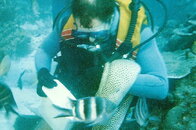- Messages
- 93,422
- Reaction score
- 91,703
- Location
- On the Fun Side of Trump's Wall
- # of dives
- 2500 - 4999
What I really wonder is just what kind of capacity for learning do these animals have? If fish operate almost purely on instinct can you really alter their behavior long term? I know the beta in my fish tank has come to associate me coming to his tank in the morning with food. This is a fish that has been in captivity it's whole life, yet I suspect that it would revert back to it's wild state almost instantly if I were to release it.
Used to be a wolf eel at a popular site down in Hood Canal that got so used to being fed hot dogs that it would accept ... then spit out ... an offered urchin.
Urchins are its natural food. This one had obviously developed a preference for Oscar Meyer.
... Bob (Grateful Diver)





